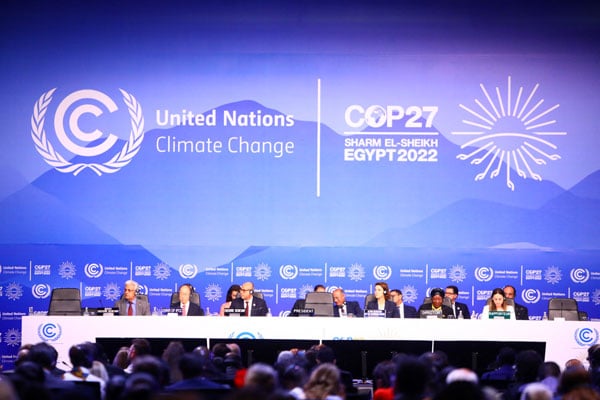COP27: Uganda wants compensation for climate-linked losses

The Minister of State for Environment Ms Beatrice Anywar (right) being welcomed at COP27 summit in Sharm el-Sheikh, Egypt. Photo/ Courtesy
SHARM EL SHEIKH, EGYPT: Uganda has joined other African countries in calling on the developed world to commit to funding losses and damages from climate change.
The loss and damage debate, which is expected to take center stage at the UN Climate Conference, has pitted the developing world against the rich nations, with the former demanding that the latter pay compensation to vulnerable countries hit by climate disasters, such as droughts and flooding.
Loss and damage funding would compensate for the destruction caused by climate change that countries cannot avoid or adapt to. The contention though, is on what exactly to pay for – damaged infrastructure and property, natural ecosystems (wetlands, forests) or cultural sites. Research suggests that by 2030, the combined climate-linked losses of 55 vulnerable countries could reach $580 billion per year.
This year’s Climate Conference (COP27) is coming on the heels of climate disasters in Pakistan, Nigeria, Uganda, and China, among others this year.
Ms Beatrice Anywar, the Minister of State for Environment, says African countries will not be joining the Conference as beggars for money, but they have a right to be compensated because they are contributing to sinking carbon emissions, mostly from developed countries.
“What we need to hear from here (COP27) is that loss and damage are included on the agenda. Why we are progressing with this is that as a continent, our water bodies, forests, and wetlands are part of those sinking the global carbon emissions (produced by the developed countries). It is high time we started the conversation about valuing what we have as a continent. Can we factor what the value is? It has to become a negotiating tool,” Ms Anywar argues.
African and other developing countries argue that the Western world has historically caused the bulk of change since the beginning of the industrial revolution and it is now time to pay. Last year, at UN climate talks, a proposal for a dedicated funding mechanism for loss and damage was at the top of the political agenda but was blocked by wealthy countries like the United States and members of the European Union. Only Denmark, Scotland and Wallonia have made some funding commitments for loss and damage.
Launching a fund would mean countries agreeing on where the money should come from, how much rich countries should pay and which counties qualify for compensation.
“We are looking at the funds which we were promised. The $100 billion that we were promised by our development partners that would help us as a country to go into climate resilience, adaptation and mitigation. We are talking about loss and damage due to effects of climate change, such as, landslides, flooding, droughts which have cost us lives and property,” Ms Anywar says, echoing the frustration of many African countries which are finding difficulties and delays in securing climate finance.
Anywar adds that top on Kampala’s Climate Agenda is the Kampala Declaration. In July, this year, African countries endorsed the Kampala Ministerial Declaration on Migration, Environment and Climate, with the aim of tackling climate change induced migration and displacement.
“We are happy that we are advancing the Kampala Declaration. We need to put money into that intervention and discuss it, not only as a Uganda factor but a global factor. As a country, we have done much to host migrants and we need money that can help us build climate resilience, build back the infrastructure, beef up the social infrastructure which we are sharing with the migrants which we have welcomed in our country,” she says.
The Kampala Declaration aims at bringing nations across the East and Horn of Africa region to galvanise global support to deal with the impact of climate change on human mobility.





